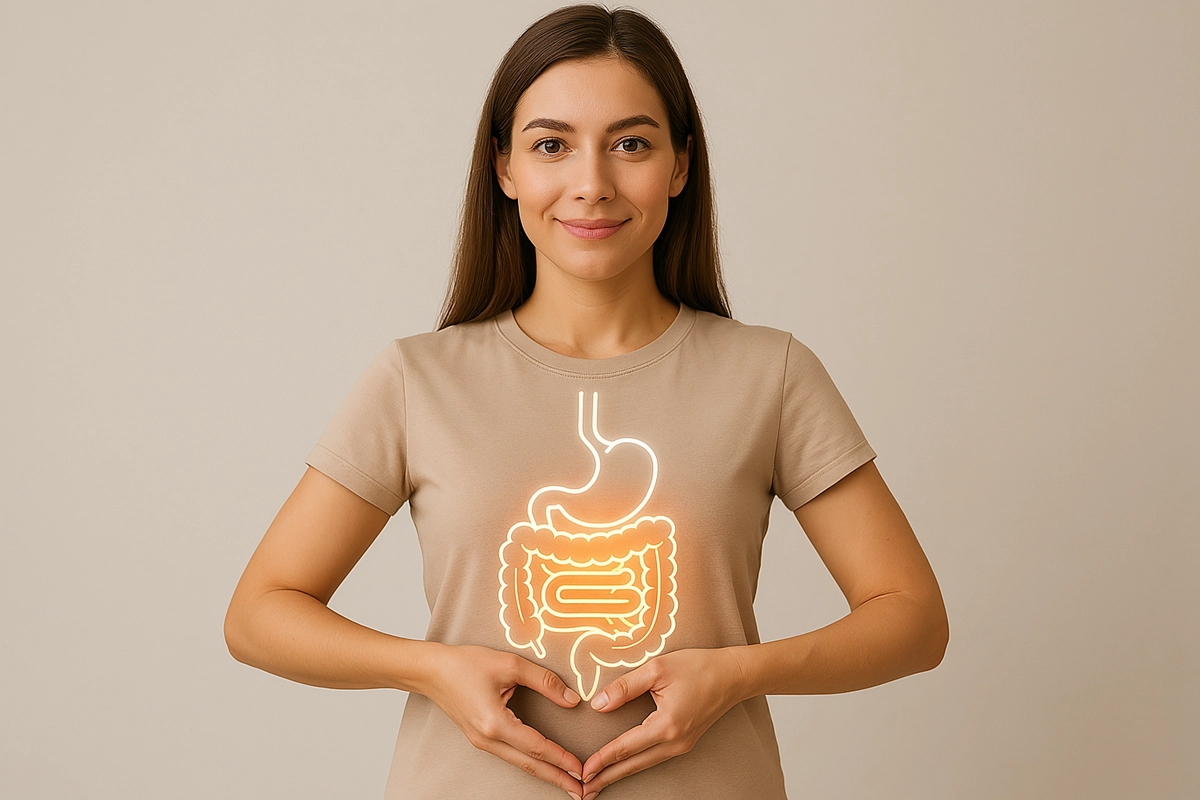Your gut is like a bustling metropolis with trillions of microorganisms working around the clock. If you’re struggling with digestive issues, you’re not alone – even Arnold faced similar challenges during his peak competition years.
You’ll discover proven natural strategies that can transform your digestive health, from strategic meal timing to specific food combinations that enhance nutrient absorption.
Let’s explore how to build a foundation for optimal gut performance.
Introduction To Digestive Wellness
A healthy digestive system helps your body absorb nutrients. It keeps your energy levels high. It also removes waste efficiently. Poor digestion can cause discomfort. It can lead to serious health problems.
Good digestion supports your immune system. It improves your mood and mental health. It keeps your skin healthy. Eating a balanced diet helps. Drinking plenty of water is also essential.
Gut health affects your whole body. A happy gut means a happy mind. It can reduce anxiety and depression. Good bacteria in your gut fight off harmful bacteria. This keeps you from getting sick.
Exercise improves your digestion. It keeps your gut healthy. Sleeping well also helps. Your gut needs rest to function well. Avoiding stress is important too.
Decoding The Gut Microbiome
Gut bacteria help break down food. They produce enzymes to break down complex carbohydrates. These bacteria also produce vitamins such as B12 and K, playing a crucial role in nutrient absorption.
Good microbes keep the gut healthy. They fight off harmful bacteria. A balanced gut means better digestion. Bad microbes can cause issues like gas and bloating. Eating fiber-rich foods helps balance the gut. Probiotics also support good bacteria.
Signs Of An Unhappy Gut
Common digestive problems include bloating, gas, and constipation. Many people also experience diarrhea and stomach pain. These issues can make daily life hard. Food intolerances are another common problem.
They can cause discomfort and inflammation. Acid reflux is also a sign of an unhappy gut. This happens when stomach acid moves up into the esophagus.
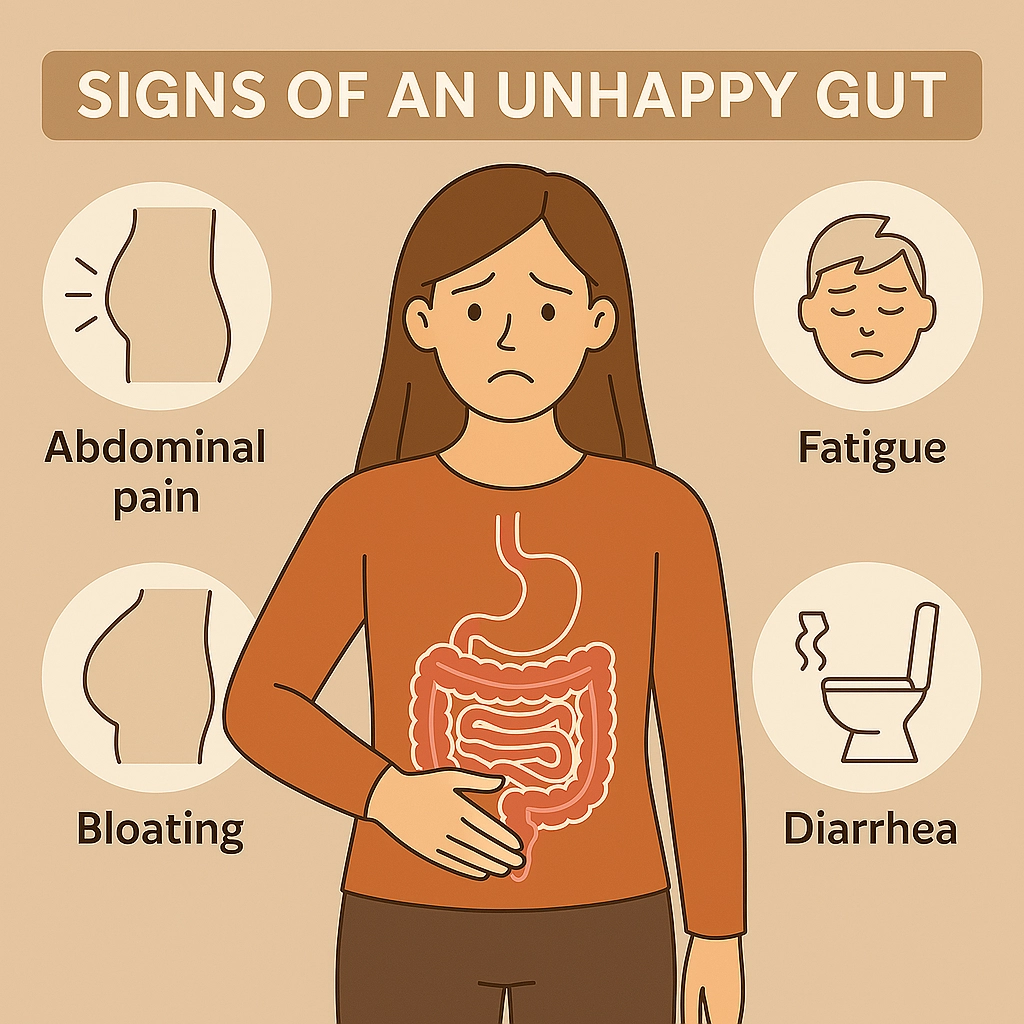
Seek medical advice if digestive issues last more than a few days. Severe pain or bleeding needs immediate attention. Unexplained weight loss is also a concern. Persistent vomiting can lead to dehydration.
Long-term changes in bowel habits should not be ignored. Doctors can run tests to find the problem. Early diagnosis helps in effective treatment.
The 11 Ways to Improve Your Digestive Health
1. Eat Whole Foods
While supporting your digestive health may seem complex, one of the most effective strategies is remarkably simple: eat whole foods.
These unprocessed foods provide essential nutrients that nourish the good bacteria in your gut and support a healthy digestive process.
When you choose whole foods, you’re giving your body the prebiotic fibres it needs to maintain a balanced gut microbiome.
Fresh fruits, vegetables, whole grains, and legumes contain natural compounds that promote digestive health without the artificial additives found in processed foods.
Think of your gut like a well-oiled machine; it needs the right fuel to function correctly.
2. Get Plenty of Fiber
Since fiber acts as your digestive system’s cleanup crew, getting enough of it daily is essential for maintaining excellent gut health. You’ll find soluble fiber in fruits and legumes, which feed your gut bacteria and help produce compounds that reduce gastrointestinal symptoms.
Meanwhile, insoluble fiber from foods like brown rice and vegetables keeps things moving smoothly through your digestive system.
To support your digestive enzymes and prevent digestive issues, aim to include both types of fiber in your meals. Load up on whole grains, vegetables, fruits, and beans throughout the day to stay healthy.
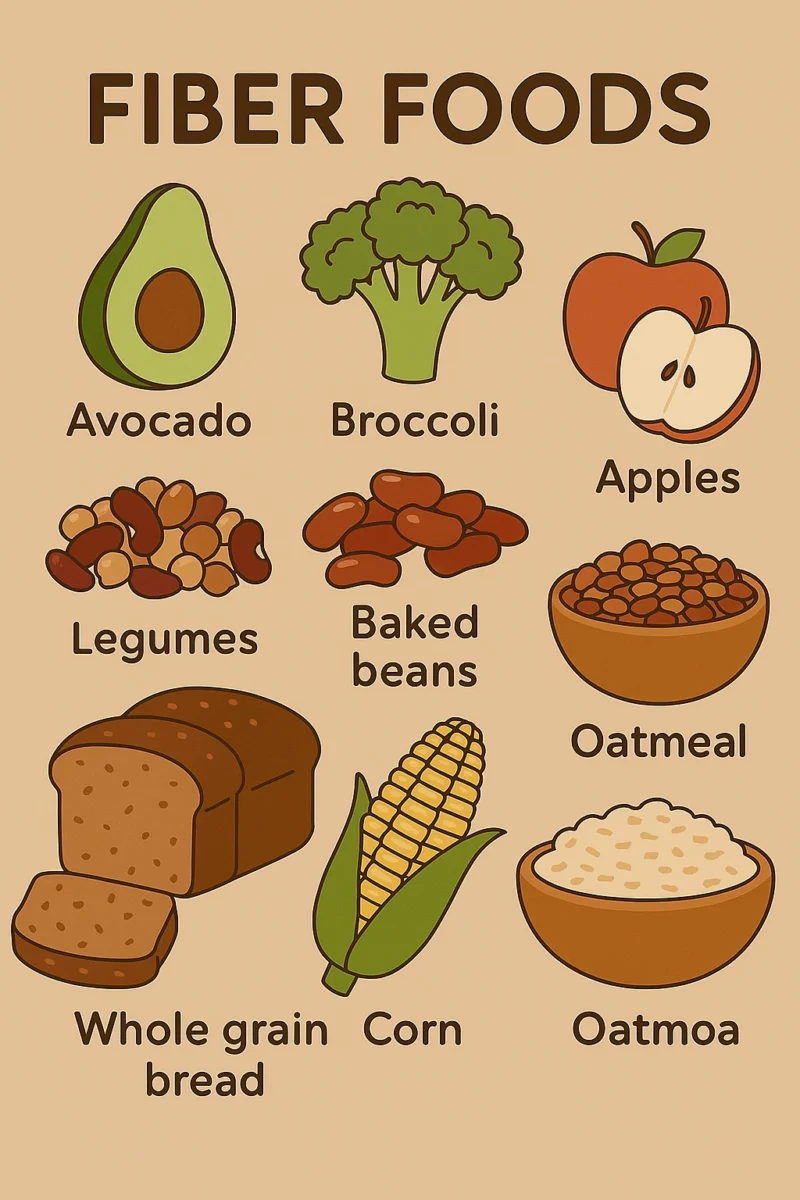
These fiber-rich foods will help maintain regular bowel movements, reduce bloating, and create an advantageous environment for your gut microbiome to thrive.
3. Add Healthy Fats to Your Diet
Although many dieters fear fat, incorporating the right kinds into your meals supports ideal digestive function. Your digestive system relies on healthy fats to stimulate bile production, which helps break down food efficiently.
Adding foods rich in healthy fats, such as avocados, nuts, and salmon, does more than just aid digestion. These fats are essential for absorbing fat-soluble vitamins A, D, E, and K, which play significant roles in supporting your immune system and maintaining a strong intestinal lining.
They’re also crucial in regulating inflammatory processes throughout your body.
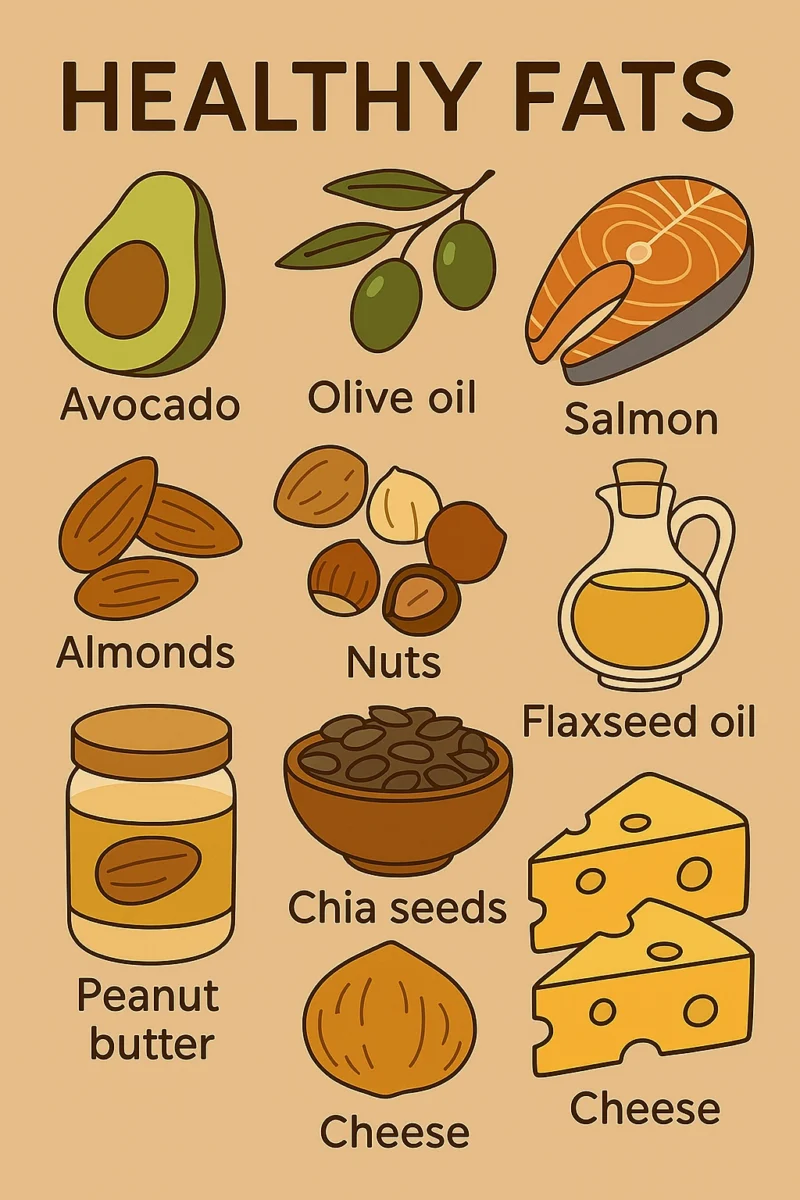
To optimize your digestion, aim to include a source of healthy fat at each meal. You’ll notice improved nutrient absorption and better overall digestive comfort.
4. Stay Hydrated
Water is your digestive system’s best friend and most vital partner. When you stay hydrated, you’re helping your body dissolve food efficiently, activate essential digestive enzymes, and transport nutrients where they need to go. It’s like giving your internal machinery the ideal lubricant to run smoothly.
Dehydration can lead to various digestive problems, from constipation to bloating. Your beneficial bacteria need adequate water to thrive, and without it, you might experience uncomfortable digestive symptoms.
Just as Arnold always emphasized the importance of proper hydration during training, your gut requires consistent water intake to prevent gastrointestinal diseases and maintain peak function.
Make it a habit to drink water throughout the day – your digestive system will reward you with better nutrient absorption and smoother elimination processes.
5. Manage Stress
While you may focus heavily on nutrition and exercise, your mental state plays a crucial role in digestive wellness through the gut-brain axis.
When you’re stressed, your body activates fight-or-flight responses that can disrupt normal digestive functions and alter your gut microbiome.
To manage stress and support digestive health:
- Practice daily meditation or deep breathing exercises
- Schedule regular exercise sessions
- Get 7-8 hours of quality sleep
- Limit processed foods that can increase inflammation
- Set boundaries at work and home
These strategies help prevent stress-related digestive issues, such as inflammatory bowel disease, and support a healthy immune response.

Remember Arnold’s wisdom: “The mind is the limit. As long as the mind can envision something being possible, you can do it.” This applies to both mental and digestive wellness.
6. Eat Mindfully
Since your digestive system functions best when you’re fully present and relaxed, mindful eating serves as a powerful tool for ideal digestion and nutrient absorption.
By eating slowly and deliberately, you allow your body to enter a rest-and-digest state, which optimizes digestive health and reduces stress levels.
Here’s why mindful eating matters:
- It enhances the breakdown of food through increased saliva production
- It helps prevent common issues like gastroesophageal reflux disease
- It gives your stomach acid time to process your meals properly
When you practice mindful eating, you’ll naturally make better food choices, gravitating toward nourishing options like fermented foods while reducing your intake of processed and fried foods.
Remember to chew thoroughly, put your fork down between bites, and focus on the flavors and textures of your food.
7. Chew Your Food
Although mindful eating enhances digestion overall, properly chewing your food stands as the vital first step in breaking down nutrients effectively.
When you chew thoroughly, you’re maximizing your digestive health by increasing the surface area of food particles, allowing digestive enzymes to work more efficiently.
Your saliva plays a crucial role in proper digestion, introducing vital enzymes and moisture that initiate the breakdown of food before it enters your digestive system.
Think of it as pre-processing your meals – just as you wouldn’t skip your warm-up before a workout, don’t rush through chewing.
Taking time to chew properly helps prevent bloating and stomach discomfort by ensuring food moves smoothly through your digestive tract.
This simple practice can make a significant difference in how well your body processes nutrients.
8. Get Moving
Physical movement goes hand in hand with proper chewing to enhance your digestive wellness. Regular exercise enhances your gut health by increasing blood flow to your digestive system and improving the efficiency of your digestive muscles.
You’ll notice better nutrient absorption and improved immune cell function when you stay active. Exercise doesn’t just help prevent cardiovascular disease – it’s also a powerful tool for managing autoimmune diseases and supporting your digestive system.
When combined with probiotic foods, physical activity helps your body produce more short-chain fatty acids, which are essential for intestinal health. By incorporating just 30 minutes of moderate exercise into your daily routine, you’re giving your digestive system the movement it needs to function effectively.
Whether it’s walking, swimming, or cycling, find activities that you enjoy and incorporate them into your gut-health strategy.
9. Slow Down and Listen to Your Body
When your body sends signals about digestive discomfort, it’s vital to pause and pay attention rather than pushing through the symptoms.
Whether you’re experiencing digestive issues from high-fat foods or potential food poisoning, your body’s warning signs shouldn’t be ignored.
Maintaining a proper balance of colon bacteria through probiotic supplements is essential for preventing more serious conditions, including heart disease.
If you’re experiencing persistent digestive problems, don’t try to power through them like you’d a challenging workout.
Instead:
- Track your symptoms and when they occur
- Note which foods trigger discomfort
- Document any lifestyle changes that affect your digestion
- Consult a healthcare provider if symptoms persist
10. Consider Lifestyle Changes
If you’re experiencing digestive issues, it’s time to examine certain lifestyle habits that may be working against your wellness goals.
You’ll want to evaluate your relationship with smoking, alcohol consumption, and late-night eating, as these everyday habits can significantly impact your digestive health.
Making positive changes in these areas isn’t just about following rules – it’s about creating a foundation for better overall health, just as Arnold always emphasized that success comes from disciplined daily choices.
#Smoking
Smoking’s devastating impact on digestive health extends far beyond commonly known respiratory issues.
When you smoke, you’re disrupting your gut’s delicate microbiome balance, leading to dysbiosis and compromising your overall digestive process. Your body’s natural defenses weaken as smoking reduces saliva production and impairs the sphincter muscle between your esophagus and stomach.
Recent research confirms that if you’re a smoker, you’re considerably increasing your risk of developing severe gastrointestinal conditions. These include acid reflux, Crohn’s disease, and gallstone disease.
The harmful effects are cumulative – smoking delays gastric emptying, making it harder for your body to process nutrients effectively. By quitting smoking, you’ll not only protect your respiratory system but also preserve your digestive tract’s essential functions and reduce your risk of developing severe digestive disorders.
#Alcohol
Although many view alcohol as a social necessity, its impact on digestive wellness can be severe and long-lasting. To protect your digestive system, you’ll need to be mindful of how alcohol interacts with other dietary factors, including spicy foods and FODMAP foods that can further irritate your stomach.
Consider these alcohol-related digestive health guidelines:
- Limit or eliminate alcohol consumption, especially if you have celiac disease.
- Don’t mix alcohol with trigger foods that aggravate your stomach.
- Stay hydrated by drinking water between alcoholic beverages.
- Support your system with plant foods rich in fiber and nutrients.

#Late-Night Eating
Late-night eating habits can wreak havoc on your digestive system and derail your wellness goals. When you eat close to bedtime, your body’s natural circadian rhythm is disrupted, causing your metabolism to slow considerably.
The muscles in the digestive system aren’t operating at peak efficiency during sleep, which means your food isn’t properly processed.
To optimize your digestion, stop eating at least 2-3 hours before bedtime. If you’re craving something in the evening, opt for lighter alternatives, such as prebiotic sodas, instead of heavy meals.
11. Incorporate Gut-Supporting Nutrients
Your digestive system requires specific nutrients to function effectively, and you’ll want to focus on three key players: probiotics, glutamine, and zinc.
Probiotics help maintain healthy gut bacteria, while glutamine serves as fuel for the cells lining your digestive tract.
Zinc supports your intestinal barrier and helps break down nutrients, making it essential for overall digestive wellness.
#Probiotics
While the human body naturally maintains beneficial bacteria, incorporating probiotics through diet and supplements can significantly enhance the diversity and strength of your gut microbiome.
Here’s how you can boost your probiotic intake:
- Consume fermented foods like yogurt, kefir, sauerkraut, and kimchi daily
- Look for supplements containing multiple bacterial strains
- Start with small amounts and gradually increase your intake
Think of probiotics as your gut’s training partners – they’re working 24/7 to keep your digestive system functioning at its finest.
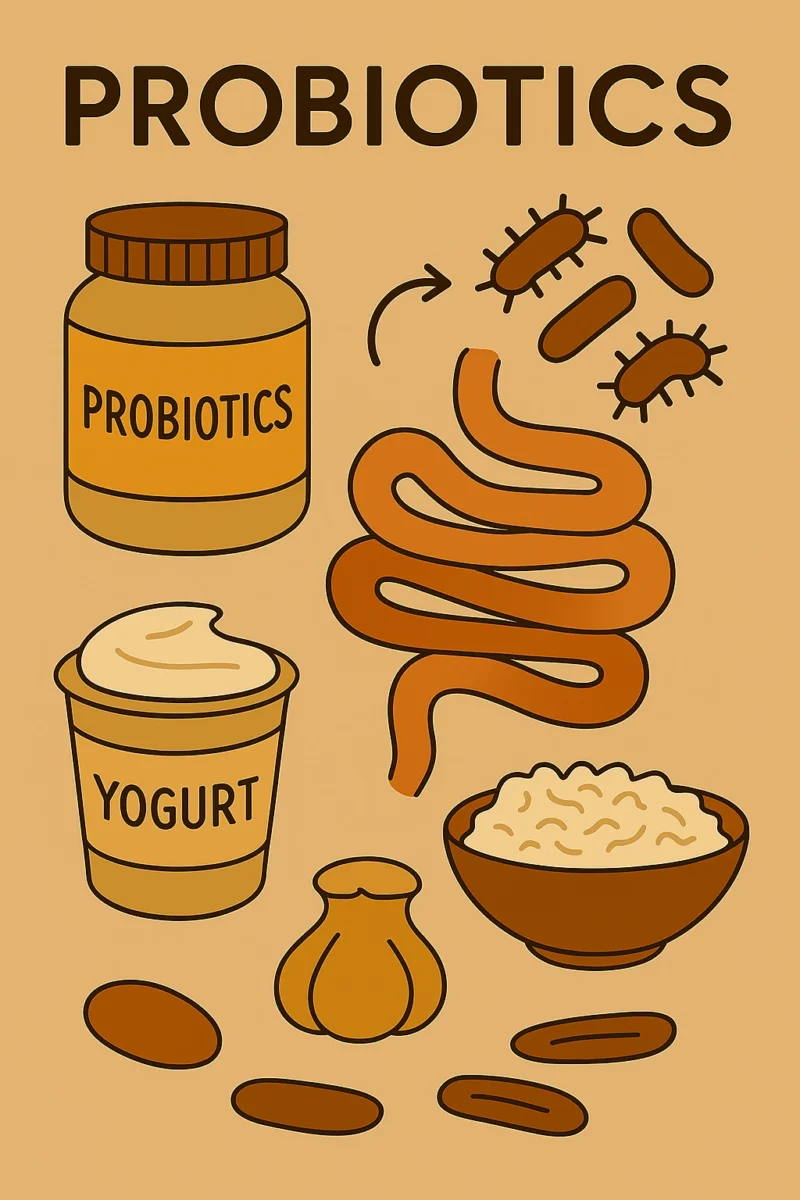
Just as Arnold emphasized the importance of proper nutrition for muscle growth, you’ll want to prioritize these beneficial bacteria for superior digestive health.
Your gut houses trillions of these microscopic allies, and they’re essential for:
- Breaking down food effectively
- Supporting nutrient absorption
- Maintaining digestive balance
- Strengthening immune function
#Glutamine
Strength in digestion starts with glutamine, an essential amino acid that acts like a personal security guard for your intestinal walls.
You’ll find this powerful nutrient working tirelessly to repair and strengthen your gut’s protective barrier, much like Arnold always emphasized the importance of building a strong foundation.
Here’s what glutamine does for your digestive health:
- Supports the repair and growth of intestinal cells
- Reduces inflammation throughout your digestive tract
- Enhances immune cell function in your gut
- Maintains the integrity of your intestinal barrier
Think of glutamine as your gut’s construction crew, constantly rebuilding and maintaining your digestive system’s infrastructure.
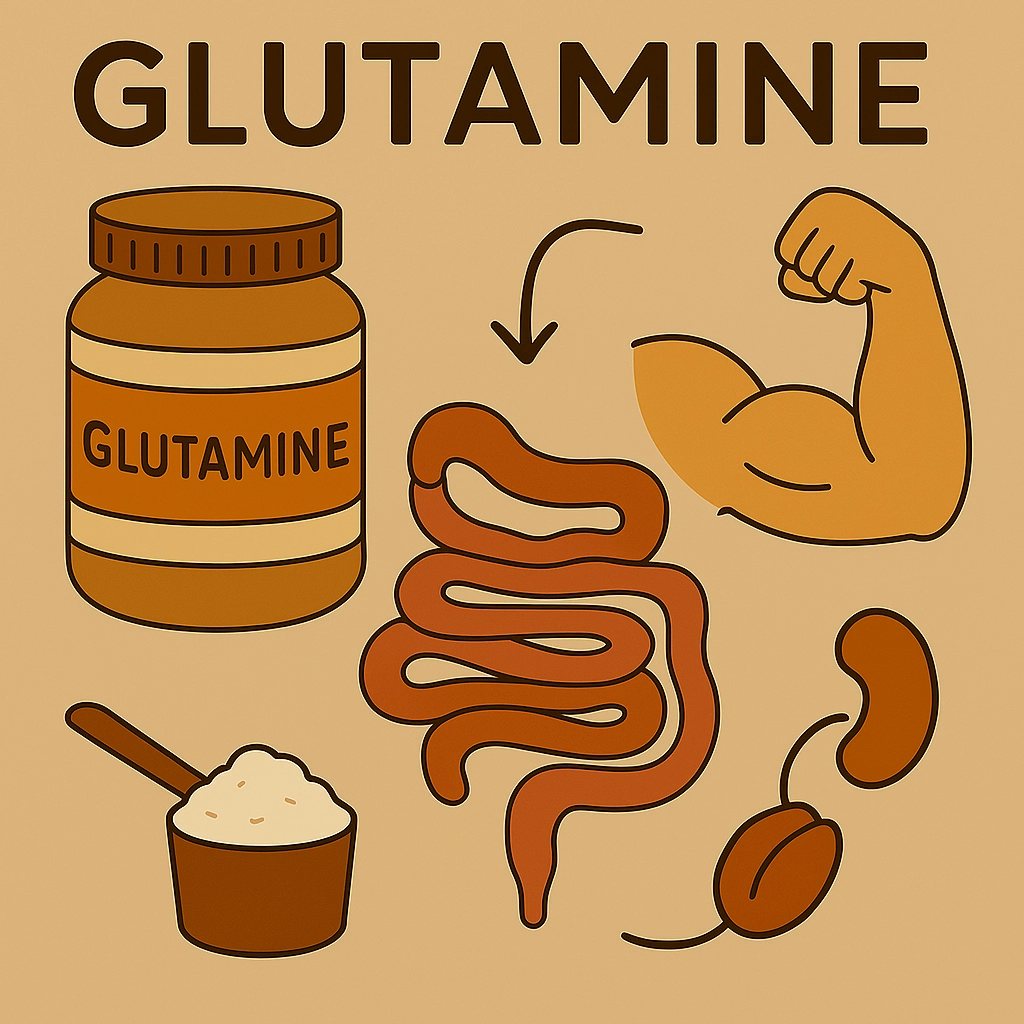
When you’re serious about optimizing your digestive health, you’ll want this amino acid on your team, working around the clock to keep your gut strong and resilient.
#Zinc
Like a master craftsman forging unbreakable steel, zinc works diligently to reinforce the foundation of your digestive system. This essential mineral serves as a protector for your gut, helping to maintain a healthy balance of beneficial bacteria in your microbiome.
When you’re looking to optimize your digestive wellness, zinc’s dual-action approach makes it a powerhouse nutrient:
- Fights inflammation throughout your intestinal tract
- Supports rapid healing of the gut lining
- Promotes the regeneration of intestinal cells
- Strengthens your intestinal barrier
Just as Arnold always said, “The last three or four reps are what makes the muscle grow,” it’s zinc’s consistent work in your system that makes the difference.
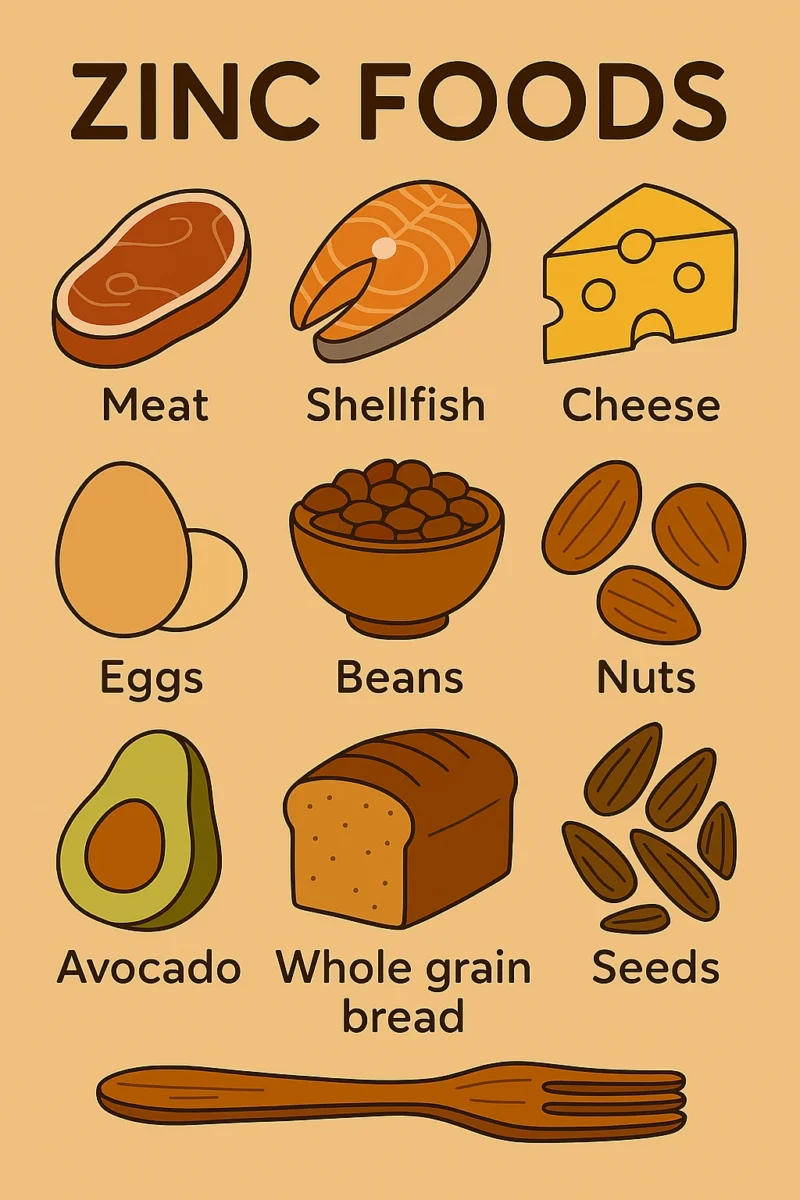
Your gut needs this mineral’s protective properties to maintain peak performance and ward off digestive issues.
Nutritional Building Blocks For Gut Health
Yogurt is rich in probiotics that help balance gut bacteria. Kefir is another good option for probiotics. Whole grains provide fiber, which aids digestion. Fruits like apples and bananas are high in fiber and pectin. Ginger helps reduce nausea and improves stomach motility. Leafy greens like spinach provide magnesium, which aids in muscle function in the gut.
Processed foods often lack nutrients and contain preservatives. High-fat foods can slow down the digestive process. Spicy foods may irritate the stomach lining. Artificial sweeteners can cause bloating and gas. Carbonated drinks may increase stomach acid. Excessive caffeine can lead to acid reflux.
The Power Of Probiotics And Prebiotics
Probiotics are good bacteria that help our gut. They live in our intestines. Yogurt and kefir are great sources. Fermented foods like sauerkraut and kimchi also have probiotics. These foods help balance the bacteria in our gut. Better digestion and a strong immune system are benefits. Some studies show they can help with diarrhea and constipation. Probiotics can also reduce bloating and gas. They are good for our overall health.
Prebiotics are food for the good bacteria. They help probiotics grow. Bananas and onions are rich in prebiotics. Garlic and leeks also have prebiotics. Whole grains are another good source. Prebiotics help improve digestion. They can boost your gut health. Some people find they have more energy. Others notice less bloating. Eating prebiotics can make your stomach feel better.
Hydration And Digestive Function
Proper hydration supports digestive health by aiding nutrient absorption and maintaining bowel regularity. Drinking sufficient water helps prevent constipation and promotes a healthy gut environment.
1. Water’s Role In Digestive Health
Water helps break down food so your body can absorb nutrients. It keeps the digestive system moving smoothly. Drinking enough water helps prevent constipation. Water softens the stool, making it easier to pass. It also helps the intestines remove waste more efficiently.
2. How Much Water Should You Drink?
Most people should drink about eight 8-ounce glasses of water a day. This is roughly 2 liters or half a gallon. Your needs might be different if you are very active. Some foods, like fruits and vegetables, also contain water. Make sure to drink more water if you eat less of these.
To Wrap It All Up
You’ll find that improving digestive health naturally means making conscious choices every day. Focus on whole foods, stay hydrated, and move your body regularly.
Listen to your gut’s signals, manage stress through meditation, and embrace lifestyle changes that support your wellness journey. By consistently incorporating these proven strategies, you’re building a foundation for optimal digestive health and overall well-being.
FAQs
What Is Digestive Health and Why Is It Important?
Digestive health refers to the efficient functioning of the gastrointestinal tract, including nutrient absorption and waste elimination. It is important because poor digestion affects immunity, energy, and mental health. A healthy digestive system supports nutrient delivery, prevents inflammation, and maintains overall well-being.
How Long Does It Take to Improve Gut Health?
Gut health can improve within 2 to 4 weeks with dietary changes, probiotic intake, and reduced stress. Some individuals may see benefits sooner, but lasting improvements depend on consistency. Fiber-rich foods, hydration, and avoiding processed foods accelerate gut healing and microbiome balance.
What Causes Poor Digestion?
Poor digestion is caused by low stomach acid, lack of fiber, dehydration, stress, and processed foods. Eating too fast, antibiotic use, and food intolerances also contribute. These factors disrupt enzyme function, reduce nutrient absorption, and irritate the gut lining.
Best Foods to Improve Digestion Naturally
Best foods to improve digestion naturally include yogurt, kefir, sauerkraut, ginger, papaya, oats, and leafy greens. These foods contain fiber, enzymes, and probiotics that aid gut function. Eating fermented and high-fiber foods regularly supports bowel movements and balances gut bacteria.
What Is the Gut Microbiome?
The gut microbiome is the community of trillions of bacteria, fungi, and microbes living in the digestive tract. It influences digestion, immunity, and brain health. A balanced microbiome helps absorb nutrients, prevent infections, and produce neurotransmitters like serotonin.
How Much Fiber Do I Need for Gut Health?
Adults need 25–38 grams of fiber daily to support gut health. Fiber improves bowel regularity, feeds beneficial gut bacteria, and reduces inflammation. Soluble fiber slows digestion, while insoluble fiber adds bulk. Meeting daily fiber needs promotes digestion and prevents constipation.
What Are Probiotics and How Do They Help Digestion?
Probiotics are live microorganisms that improve digestion by balancing gut bacteria. They help break down food, produce vitamins, and strengthen the gut lining. Probiotics also reduce gas, bloating, and diarrhea by restoring microbial balance in the intestines.
Can Drinking More Water Help Digestion?
Drinking more water helps digestion by softening stool, preventing constipation, and aiding nutrient absorption. Water keeps the digestive tract lubricated and supports enzyme function. Staying hydrated ensures smoother digestion and regular bowel movements.
Is Bloating a Sign of Poor Digestive Health?
Bloating can be a sign of poor digestive health caused by gas buildup, food intolerances, or imbalanced gut bacteria. Frequent bloating may signal issues like IBS, enzyme deficiency, or slow motility. Identifying triggers and adjusting diet can reduce symptoms.
Digestive Enzymes vs Probiotics: What’s the Difference?
The main difference between digestive enzymes and probiotics is that enzymes break down food, while probiotics balance gut bacteria. Digestive enzymes aid nutrient absorption by catalyzing chemical reactions. Probiotics are live microbes that support long-term gut health and immune function.
Prebiotics vs Probiotics: Which Is More Effective?
The main difference between prebiotics and probiotics is that prebiotics feed beneficial bacteria, while probiotics are the bacteria themselves. Both improve digestion, but prebiotics may be more effective long term by enhancing the growth of native gut flora.

